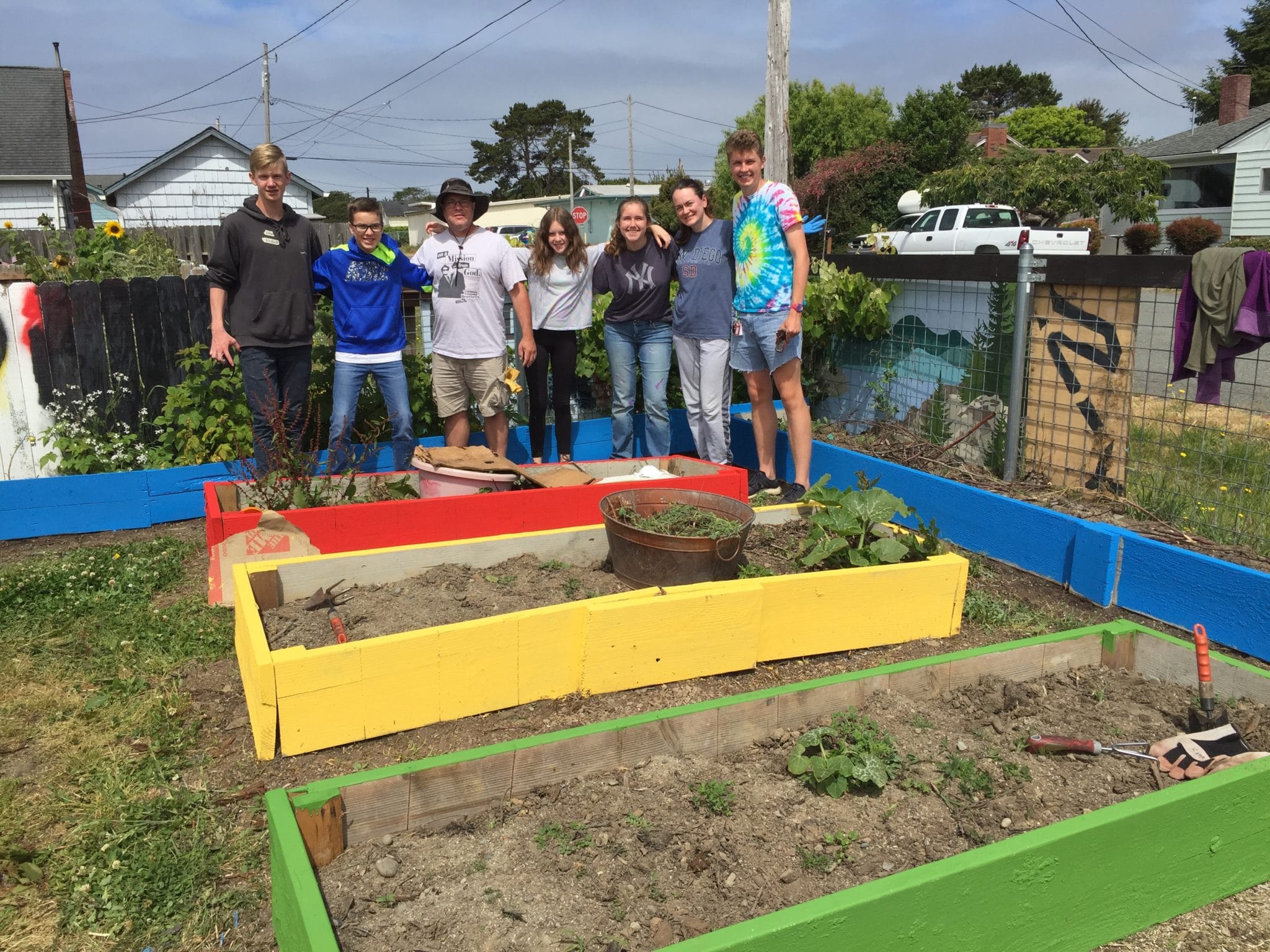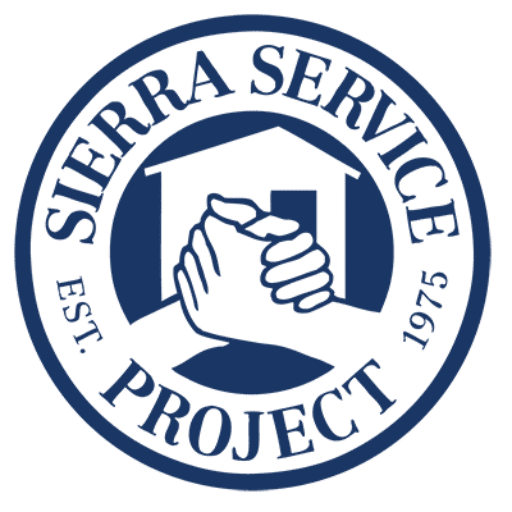
By Smith River Staff
Bruce Ferguson (Site Director), Austin Jones (Spiritual Life Coordinator), Erin Kistler, Colleen Mirza, and Alli Muesling
This summer was our eighth year partnering with the Smith River and Del Norte County communities. Over the years, SSP has cultivated deep connections with community members and partner organizations in this region to serve and advocate with local residents.
Community Crossing: Building Bridges
Through SSP’s online program, we had three Community Crossing sessions led by community partners and staff:
Card making for the Del Norte Senior Center and Smith River UMCA presentation from Dar Caldwell about the K!DS Learning GardenA presentation from Tara Dettmar about the Tolowa Dunes Stewards
Each of these organizations has added depths to SSP’s in-person summers, providing insight into Del Norte County’s environment and residents. We worked together to plan and carry out creative sessions and presentations about the community, ensuring participants would get a sense of the area’s culture, history, and dynamics without being physically present.
The card making days were a great way to invite participants to engage with the community, producing tangible gifts for organizations who have hosted us in the past. It was not quite the same as seeing the joy on a homeowner’s face when they see their finished ramp, stairs, or shed, but it was the closest we could get. For the Del Norte Senior Center, we created a Google Slides presentation where participants could add individual slides with words of encouragement and affirmation in whatever creative way they saw fit. Each slide will be printed out and mailed to the Senior Center as a way to stay connected and spread love during an isolating time.
"The card making days were a great way to invite participants to engage with the community, producing tangible gifts for organizations who have hosted us in the past."
For Smith River UMC, we hand made cards on construction paper, and used Zoom to record a video of participants sending their love and excitement for future partnership, which will be shown to the church congregation. These projects allowed volunteers to creatively engage in service and show how they can continue to serve while at home. While sheltering in place, we have found that doing things with our hands is a great stress-reliever which reduces the tendency to live only in our minds.
"While sheltering in place, we have found that doing things with our hands is a great stress-reliever which reduces the tendency to live only in our minds."
A 2019 youth participant creates art for the K!DS Learning Garden, or "Dar-den" as it's affectionately called.
Dar’s presentation was a delightful whirlwind tour of the K!DS Learning Garden and all it has to offer the Smith River community. He made a point to highlight SSP’s previous contributions to the garden, so youth could see what types of projects they could possibly be involved in for the future. He also emphasized the importance of helping keep community gardens alive during this time, when communities and individuals are struggling with food access. As of June 2020, the Del Norte Triplicate reported that the current pandemic has increased the need for food in the community by 200%. In discussion with Dar and the staff, youth explored how they could be involved with responding to food insecurity in their local communities. Participants actively asked questions, wanting to learn more from Dar about the K!DS Learning Garden. They were excited about potentially getting to visit the garden and serve with Dar during future trips to Smith River.
"As of June 2020, the Del Norte Triplicate reported that the current pandemic has increased the need for food in the community by 200%."
Tara’s presentation was incredibly informative, both about the biodiversity of Del Norte County and the history of indigenous Tolowa Dee-ni’ and their ancestral lands on the Tolowa Coast. This was a great opportunity for us to discuss tribal sovereignty and how colonization has had innumerable impacts on the Tolowa Dee-ni’ people. We were excited to engage participants in this conversation as awareness of racial and environmental justice increases throughout the country. Bringing those issues to light this summer was impactful as participants could understand how larger movements affect communities like Smith River.
Advocacy While Sheltering in Place
Community Crossing sessions were not the only opportunities to talk about service and justice. Afternoon Choose an SSP Adventure sessions focused on advocacy were, to our great joy, very impactful and fulfilling. At the Calling Your Reps 101 session, youth and adults showed up ready to roll up their sleeves and make some calls. Each person was passionate about a particular cause (or many!) and eager to make a difference in their local community. While this session was specifically tailored to shelter in place (you can call your representatives from your bed!), we look forward to advocacy-focused programs becoming a staple of SSP’s future programs. We envision a broad array of ways youth can engage as advocates: focusing on the community in which we are serving, building broad skills to carry back to our home communities, and more.
"We look forward to advocacy-focused programs becoming a staple of SSP’s future programs."
Advocacy sessions are also a fantastic opportunity to present a community-centered, liberatory vision of Christianity that contests the power-hungry, colonialist legacy that the Church, as an institution, has historically too often left in its wake. We as Christians can acknowledge and take responsibility for the latter while championing the former, emphasizing the radical politics of Jesus and his dedication to uplifting the oppressed. Youth want to know how to repair a broken world; let’s show them that faith can be the basis of that reparation.
Online Program: Bringing Our Gifts to the Table
This summer allowed us to push our creativity in forming a new and engaging online program for participants. As a staff team, we were able to bring our own talents and interests to the table in a way that would not normally be integrated during an in-person summer. As we got to share our own passions, we also got to learn more about the passions of our youth and adult participants.
Smith River UMC has hosted SSP for many years and continues to be an anchor for us in the community.
Since the main focus of the summer was relational ministry, we were able to connect with the youth more than during an in-person summer. With small group sizes, we were truly able to learn about each person and share about our own lives. The online program really allowed us to take advantage of technology in new and creative ways. In-person programs don’t usually allow for this and we were presented with unique opportunities. We created team covenants using Zoom whiteboards, and sent digital cards with Google Slides and Zoom recorded videos. Technology allowed us to expand our creativity in connecting with not only the participants but our community partners.
"We created team covenants using Zoom whiteboards, and sent digital cards with Google Slides and Zoom recorded videos."
An advantage of the online program was the ability to reach participants who might not have been able to attend a regular SSP session, whether due to scheduling conflicts, cost, or travel time. The opt-in nature of the program meant youth and adults alike could participate as it was convenient for them. We had numerous participants of all ages who had never served with SSP before, and were excited about the possibility of doing an in-person summer. Afternoon Choose an SSP Adventure sessions intentionally promoted cross-site intermingling, allowing youth and adults to meet other groups of participants and staff that shared their interests. Just like in-person programs, it is always great to meet new people and form new connections through this mixing of people from different geographies and backgrounds.
"Afternoon Choose an SSP Adventure sessions intentionally promoted cross-site intermingling, allowing youth and adults to meet other groups of participants and staff that shared their interests."
Through designing and implementing this summer’s program, we found what really matters is making connections and having conversations with each other. You do not need anything but a second person to talk to in order to build a relationship and understanding. We enjoyed the opportunity to casually allow conversation to flow, just as it does during free time at a traditional in-person SSP. Often, forming strong connections does not need to start with serious topics, because relational ministry is just about making a new relationship with someone, which is one of the core values of SSP. Adapting to the circumstances the COVID-19 pandemic has brought about has made this especially apparent, as we all needed supportive outlets to safely discuss the joys and concerns in our lives - youth and adults alike.
"We found what really matters is making connections and having conversations with each other."
In the next few months, we hope SSP can continue to support youth, youth leaders, and young adults by inviting people to come together and simply talk about the unprecedented times we are all experiencing. People are feeling isolated and uncertainty is weighing heavily on everyone.. With remote learning, youth get the opportunity to receive academic material, but there isn’t really a place to simply socialize, connect with their peers, and really grow in faith and service. SSP looks forward to providing this opportunity and offering spaces for people to come together.
Editor’s Note: SSP is looking forward to fostering community year-round. We invite you to complete our program interest survey by September 30, where you can share feedback on how you’d like to see SSP live out our mission this next year. Staff alumni are also invited to socialize, network, and reconnect with the SSP community at monthly happy hours, the final Friday of each month from 5-6:30pm Pacific.
